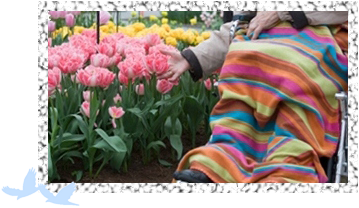Definitions
Advocacy: Action by an individual or group in support of a cause, ideal, or policy to effect change, advance a cause, or raise public awareness. Actions to achieve these goals may take the form of demonstrations, lobbying for legislative change, conducting educational activities, or organizing others. Types of advocacy include self advocacy, individual advocacy, and systems advocacy.
Self Advocacy (personal advocacy): Addressing specific issues to achieve change in one’s own life by advocating on one’s own behalf. The goal is to stand up for yourself, protect your own rights, and achieve your own dreams.
Being an effective self-advocate requires having or developing assertiveness skills, knowledge of rights, strategizing skills, and networking skills. Self advocacy activities may include effectively managing the supports and services you use or being an active participant in the decisions that effect your life such as where you live, work, or go to school.
Individual Advocacy: Action on behalf of, for, and most importantly with an individual. Focuses on providing training, information, referral, and intervention to, and with, individuals. An effective individual advocate seeks to help people develop knowledge and skills for effective future advocacy activities.
Individual advocacy may include confronting unacceptable conditions that infringe upon daily living activities and opportunities, learning how to appeal a legal decision, or filing a formal complaint or law suit.
TRCIL Service Coordinators and Peer Support staff can assist you with individual advocacy matters.
Systems Advocacy: Working to create broad based change within a system, agency, community, etc., implementing strategies to increase availability and accessibility of services and resources, and creating equal opportunities for large numbers of people with disabilities.
Systems advocacy activities may include speaking out on issues, laws, benefits, and/or practices that affect many people with disabilities; community organizing, or making legislative contracts, lobbying, presenting testimony, filing petitions, etc. Specific examples include ensuring one’s community has a responsive paratransit system, or using courts to interpret and enforce laws and regulations, such as the Americans with Disabilities Act
(ADA).
Systems advocacy usually requires a long term sustained effort by a large number of people. However, it has the power to make broad based changes happen such as the passage of the Americans with Disabilities Act (ADA) in 1990. This was landmark civil rights legislation for people with disabilities.
Because systems advocacy is so important, Three Rivers Center for Independent Living uses funds from the Office of Vocational Rehabilitation to support a full-time position of State-Wide Action Team Community Organizer (SWATCO). The State-Wide Action Team is a program that places a trained advocate at every Pennsylvania Center for Independent Living who works exclusively on systems advocacy issues. The members of this team coordinate efforts across the state with support from the PA State-Wide Independent Living Council.
D.A.R.E.
One of our local action teams is Disability Advocates for Rights and Equality (D.A.R.E.) that operates out of Three Rivers Center for Independent Living. D.A.R.E. is organized to advocate for people with disabilities, disseminate information, and create strategies for impacting public policy and access.
D.A.R.E. addresses a broad range of issues including:
- Civil rights
- Transportation
- Employment
- Housing
Please bring new issues important to you to D.A.R.E. for discussion and action. Training is available on issues as needed.
Our goals include system-wide changes to increase community accessibility, empowering people with disabilities, and furthering the common cause of our civil rights.
To see the schedule for the next D.A.R.E. meeting, please view our events calendar.
For more information call (412) 371-6954, TTY (412) 371-1254 or contact Abbie Dunn at adunn@tril.net.
